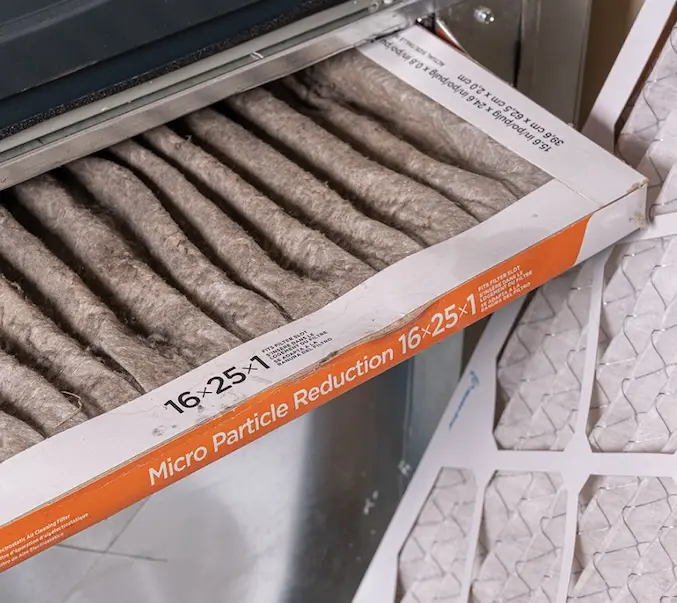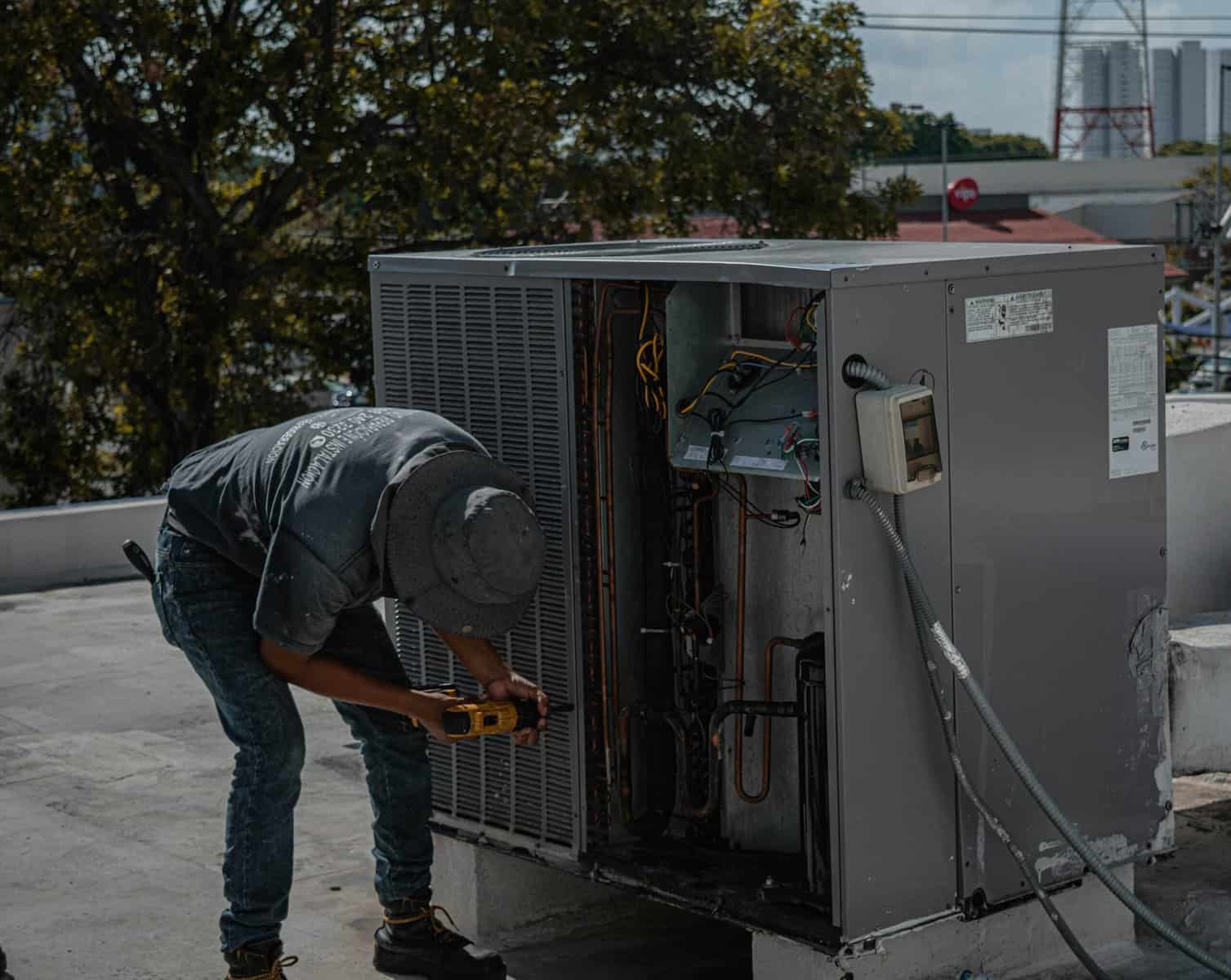So, your home feels warmer than usual? You could save thousands in replacement costs by spotting signs that your AC needs repair early.
The average air conditioning unit lasts 15–20 years, but early problem detection helps extend its life and prevents complete system failure.
Most homeowners don’t notice AC problems until serious damage occurs. Poor indoor air quality from malfunctioning systems affects nearly 50 million allergy sufferers and 24 million asthma patients throughout the US.
Your utility bills can also surge dramatically because struggling units use excess electricity to maintain desired temperatures.
Several warning signs help determine the right time to service your AC. This piece explores 5 critical red flags – from strange noises to uneven cooling – that signal your system needs professional attention before small issues turn into costly breakdowns.
These symptoms deserve immediate attention because they put both your comfort and health at risk during heat waves and could lead to significant financial strain.

Warm Air Blowing From Vents
Your AC vents release warm air instead of cool breeze? This ranks among the most obvious signs that your system needs repair. A quick understanding of the problem can help you fix it fast and save money while staying comfortable.What Warm Air From AC Means
Warm air from your vents shows that your cooling system can’t extract heat from your home’s air anymore. Your AC might still run—with the fan motor working and air moving—but the cooling function has failed. This happens because something has gone wrong with the cooling process somewhere in the system. Your air conditioner’s job is to absorb heat from indoor air and release it outside. When you feel lukewarm or hot air coming from your vents with the thermostat set to “cool,” the heat transfer process doesn’t work right. The system just moves air through your home without cooling it—similar to a fan that circulates existing warm air.Common Causes Of Warm Air From AC
Your air conditioner might blow warm air because of these issues:- Dirty or clogged air filters: This tops the list of common problems. A dirty filter blocks airflow through your system. Your AC works harder but cools less. Poor airflow stops hot air from touching the evaporator coil properly, which reduces cooling.
- Refrigerant leaks or low levels: Your cooling system’s refrigerant absorbs indoor heat. Low refrigerant levels from leaks prevent proper cooling. You might notice frozen evaporator coils, hear hissing sounds, or experience uneven cooling.
- Thermostat issues: The problem could be wrong settings, not the AC unit. Your thermostat might be on “heat” or “fan” instead of “cool,” or set higher than room temperature. A broken thermostat could send wrong signals to your system.
- Dirty condenser coils: The outdoor unit’s condenser coils release captured heat. Dirt, leaves, or debris can trap heat inside, pushing warm air back into your home.
- Frozen evaporator coil: Ice forms on your evaporator coil when airflow is poor or refrigerant leaks. Dirty filters often cause this problem.
- Compressor problems: Your AC’s compressor pumps refrigerant through the system. A broken compressor stops the cooling cycle. You’ll often hear strange noises too.
- Ductwork leaks: Even with cold AC air, leaky ducts pull warm air from attics or walls before reaching your rooms.
- Electrical issues: Your indoor fan might run while the outdoor unit lacks power, which circulates uncooled air. Check your circuit breaker if the outdoor unit stops working.
Why Warm Air Is A Problem
Warm air from your AC signals bigger troubles ahead:
Your home’s comfort drops fast in hot weather. Without proper cooling, indoor temperatures rise quickly, making living spaces unbearable during summer heat.
Your energy bills go up as the system runs non-stop without cooling properly. A struggling AC uses more electricity than a working one.
Small problems turn into expensive repairs fast. Running a faulty AC often breaks major components. A tiny refrigerant leak can destroy your compressor if ignored.
Poor cooling affects your indoor air quality. Good air conditioning controls humidity levels and prevents mold. Systems blowing warm air can’t manage humidity well.
When To Get AC Serviced For Warm Air
Take these steps if you notice warm air:
- Check the basics first: Make sure your thermostat shows “cool” and sits below room temperature. Look at your air filter and change it if it’s dirty.
- Call a professional right away if:
- Basic checks don’t solve the problem
- Resetting circuit breakers doesn’t help
- You hear weird noises or smell strange odors
- The system keeps turning on and off
- You see ice on any AC parts
Don’t ignore warm air problems. Unlike other AC issues that can wait, warm air shows problems that get worse quickly.
These problems stress your system more. Running an AC that blows warm air can turn a simple fix into an expensive replacement. A dirty filter might freeze your evaporator coil and damage the compressor if you keep using it.
Get Expert Help Before a Small AC Issue Becomes a Big Problem
If warm air is blowing from your vents, it’s time to act. These expert HVAC articles help you catch issues early, reduce repair costs, and stay cool during Florida’s hottest months.
Explore related resources handpicked to help you stay informed and in control.
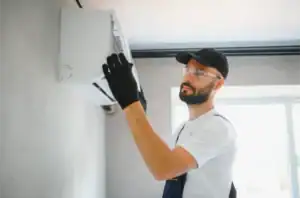
Common Air Conditioning Company Practices
What to Expect From a Professional AC Company: Services, Standards & Smart Practices Whether you’re a homeowner in Fort Lauderdale or a business owner
Strange Noises From The AC Unit
Your AC unit making strange sounds? These mysterious noises aren’t just annoying—they’re warning signals that something’s wrong. These unusual AC sounds signal problems that you can’t ignore.
What Strange AC Noises Mean
A properly functioning air conditioner should run quietly with just a low hum and gentle airflow through the vents. Any other sounds could mean trouble.
Here’s what different noises tell you about your cooling system:
- Banging or clanking points to loose or broken parts inside your unit, usually in the compressor or air handler.
- Squealing or screeching signals motor problems, belt issues, or high internal pressure in the system.
- Clickingis normal during startup and shutdown, but constant clicking usually means electrical problems or a failing thermostat.
- Hissing or bubbling often reveals refrigerant leaks that hurt cooling efficiency and might be dangerous to your health.
- Rattling usually comes from loose parts, debris, or failing components that you should fix right away.
- Buzzing could be anything from electrical problems to loose parts or a refrigerant leak that needs expert evaluation.
Each distinct sound gives clues about your system’s health. Expert HVAC technicians can often spot problems just by listening to these warning signs.
Why AC Noises Are A Problem
You should pay attention to unusual AC sounds for several key reasons:
- First, mechanical or electrical problems get worse over time. A simple loose part can damage essential components if you ignore it. Repairs become more complex and costly the longer you wait.
- Second, these problems reduce your system’s efficiency. Your AC uses more power but cools less effectively, leading to higher bills and less comfort.
- Third, some noises might warn of dangerous conditions. Refrigerant leaks can cause health issues, from skin problems to heart issues in sensitive people. Electrical problems that cause buzzing or clicking might create fire risks.
- Fourth, constant noise ruins your home’s peace. You shouldn’t have to speak louder or turn up your TV because of your air conditioner. True comfort means both the right temperature and quiet operation.
When To Get AC Serviced For Noise
Some sounds mean you need professional help right away:
- Call an HVAC technician immediately when you hear:
- High-pitched squealing or screeching (shut off your system first)
- Loud banging or thumping
- Constant buzzing or humming
- Hissing with poor cooling
- Schedule service soon (within days) for:
- Ongoing rattling after checking for obvious debris
- Clicking that goes beyond normal startup/shutdown
- Grinding or grating sounds
- Any new or strange sound that keeps happening
DIY fixes aren’t smart for most AC noise problems. You can safely remove visible debris from the outdoor unit (after cutting power), but most issues need special tools, training, and EPA certification for refrigerant problems.
Professional HVAC technicians can run complete diagnostic tests to find exactly what’s causing unusual noises. They check loose parts, measure electrical current, test refrigerant pressure, and inspect moving parts—jobs most homeowners can’t handle.
The best way to prevent noise problems is regular maintenance. Getting professional service yearly, ideally in spring before heavy use begins, helps catch potential issues before they create noises or damage your system.
Strange AC noises clearly show your system needs expert attention. Quick action on these warning signs brings back your home’s quiet comfort and stops small issues from becoming major breakdowns.
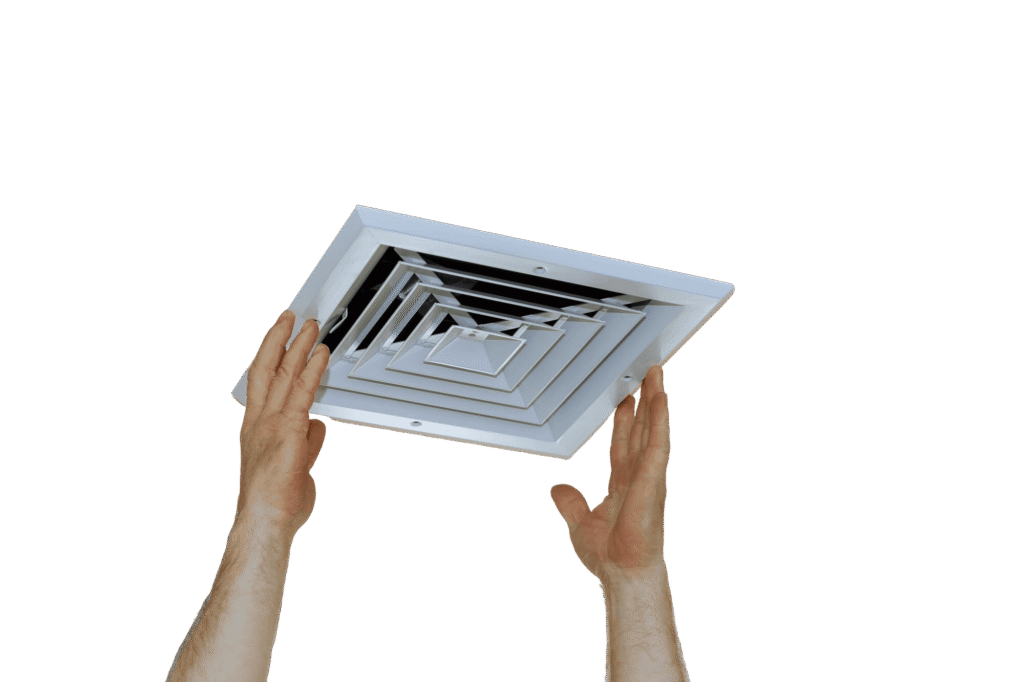
Unpleasant Odors Coming From The AC
Strange smells coming from your AC vents are more than just unpleasant. These odors that indicate underlying problems need professional attention. Quick action to understand these smells could help you avoid pricey repairs and keep your family healthy.
What AC Odors Mean
Each distinct AC smell usually points to a specific problem in your system:
- Musty or moldy smell: This common odor is like a damp basement and shows mold or mildew growing somewhere in your system, usually in the drain pan, evaporator coils, or ductwork.
- Burning or electrical smell: A burning odor usually means overheating parts, frayed wiring, or mechanical failures. The smell of burning plastic or a gunpowder-like scent usually points to a circuit board or fan motor short.
- Rotten eggs or sulfur smell: This distinct odor either points to a gas leak (natural gas has added mercaptan to create this smell) or a dead animal decomposing inside your system.
- Sweet, chemical odor: A sweet smell like chloroform usually means refrigerant leaks, which reduce cooling efficiency and create health risks.
- Dirty sock syndrome: This unpleasant foot-like smell happens when bacteria and mold grow on evaporator coils or in stagnant water in drain pans.
Your AC unit should run without any noticeable smells. Any lasting odor needs checking because it usually reveals problems that get worse without help.
Common Causes Of AC Smells
Several things can create unpleasant AC odors:
Moisture-related issues are the biggest problem behind most AC smells. Moisture buildup in drain pans, evaporator coils, or ductwork creates perfect conditions for mold and bacteria growth. This usually happens when:
- Drain lines clog with debris
- Drain pans cracked or overflowing
- Too much humidity builds up in ducts
Electrical problems usually create burning odors. These come from overheating motors, damaged wiring, or failing circuit boards. The burning smell might appear when starting an AC after long periods of disuse as dust burns off hot parts but should go away within 15–20 minutes.
System contamination happens when foreign materials get into your AC. This includes:
- Dead animals in ductwork creating decomposition odors
- Dust and debris building up on filters and coils
- Cigarette smoke particles trapped in the system
Refrigerant leaks make distinct sweet, chemical smells. Refrigerant (often called Freon) moves through closed loops in your system. Leaks create a noticeable odor. These leaks reduce cooling efficiency and can be dangerous to your health.
Stagnant water in drain pans or clogged drain lines lets bacteria grow that makes sour or vinegar-like smells. Humid climates make this problem worse.
When To Get AC Serviced For Odors
Some AC odors need immediate professional help:
- Call emergency services immediately if:
- You smell gas/rotten eggs (after leaving the home)
- You notice burning smells that stay after turning off the system
- You detect a sweet, chemical odor that points to refrigerant leaks
- Schedule urgent service (within 1–2 days) for:
- Lasting musty or moldy odors
- Dirty sock smells that stay after filter changes
- Any strange odor with poor cooling performance
Breathe Easier—Eliminate Odors With Expert HVAC Care
Unpleasant smells coming from your AC system aren’t just annoying—they could be a sign of hidden mold, bacteria, or drainage issues. At Affordable Air & Heat, we offer professional cleanings and maintenance that go beyond filter changes. Our trained technicians use specialized tools to find and fix odor sources fast, keeping your air fresh and your system running strong.
Schedule your odor-elimination service with Affordable Air & Heat today and take control of your indoor air quality.
Weak Or Inconsistent Airflow
Is your AC giving you a light breeze instead of the cool air blast you expect? Your AC might need repairs if you notice weak or uneven airflow. This is one of the first signs that something’s wrong, even before other problems show up.
What Weak Airflow Means
Your supply vents should give you a steady stream of cool air throughout your home. You might have an airflow problem if you feel little air movement when you put your hand in front of a vent, or if some rooms get good airflow while others don’t.
Poor airflow usually points to mechanical or structural problems in your HVAC system. ENERGY STAR reports that up to 20–30% of conditioned air can leak through holes or poorly connected ducts. These air leaks create pressure imbalances that show up as temperature differences throughout your home.
Common Causes Of Airflow Issues
Here are the most common reasons behind weak or uneven airflow:
- Clogged air filters: Dirty filters block air from entering your system. This makes it impossible to get enough air into your rooms.
- Blocked vents and registers: Your furniture, rugs, or other items might block vents and stop conditioned air from flowing. People often miss this simple problem that really hurts their system’s performance.
- Ductwork problems: Air flow drops with leaky, disconnected, or crushed ducts. Flexible ducts can get kinked and block air, while metal ducts might separate where they connect. A typical house loses about 20–30% of moving air through duct system leaks.
- Blower issues: The blower fan moves air through your ducts. Dirty blower wheels, worn-out motors, or damaged fan belts can cut your airflow. Sometimes the fans run slower because of voltage problems.
- Frozen evaporator coils: Coils can freeze due to refrigerant problems or blocked airflow. This creates a barrier that stops air from moving through the system. The problem gets worse as initial airflow issues lead to more freezing.
- Improper system sizing: Your unit might be too big or too small for your home. This leads to wrong cycling patterns and pressure problems that affect air distribution.
Why Airflow Problems Are Serious
You need to fix airflow problems right away because:
Your system’s mechanical problems will get worse if you ignore them. A small reduction in airflow can lead to complete system failure without proper care.
Your system has to run longer to keep up with temperature settings when airflow is low. This uses more energy and you’ll see bigger utility bills.
The extra strain on your system parts can shorten their life. Poor airflow might freeze the evaporator coil and damage your compressor – the most expensive part to replace.
Different rooms will have different temperatures because cooled air can’t spread evenly through your home.
When To Get AC Serviced For Airflow
Call an HVAC pro right away if:
- You’ve put in new filters but still have weak airflow
- Room temperatures differ by more than a few degrees
- Your system keeps running but can’t reach the temperature you want
- You spot ice on refrigerant lines or hear water dripping
- You notice strange noises or smells along with airflow problems
Start by checking your vents aren’t blocked and your filters are clean. Look at any visible ductwork for obvious damage. But you’ll need a pro to diagnose most airflow issues since many problems hide in walls or mechanical parts.
The best way to prevent airflow problems is regular professional maintenance. Yearly service should include cleaning the blower, checking ductwork, and testing components to keep proper airflow in your system.
Sudden Spike in Energy Bills
A shocking jump in your utility bill might be the first sign that your AC has problems—even before you notice any cooling issues. This unexpected cost increase could be your cooling system crying out for help.
What High Energy Bills Mean For Your AC
Your air conditioner might be struggling silently if your electric bill shoots up without any changes in how you cool your home. A well-running AC keeps you comfortable without wasting power. But failing internal parts force your system to work harder and longer for the same cooling—which drives up your electricity use. Electric rates in some areas have jumped up to 15% monthly, making these problems get pricey fast.
Common Causes Of Energy Spikes
Your AC’s energy use can spike for several reasons:
- Dirty or clogged components: Clogged filters restrict airflow and make your system run longer. Dirty condenser coils can’t release heat properly, so your system has to work overtime.
- Maintenance neglect: Your system’s performance drops sharply without regular service. Yearly maintenance stops small issues from wasting energy.
- Aging equipment: Old AC units use more electricity than newer, efficient models. Every system naturally loses efficiency as it ages.
- Leaky ductwork: Good cooled air escapes through leaky ducts. Your system runs longer to make up for this waste, pushing up your monthly bills.
- Short-cycling: Your AC wastes power by turning on and off repeatedly without finishing full cooling cycles.
Why Energy Inefficiency Is A Red Flag
High energy use points to more than just bigger bills—it usually signals mechanical problems developing inside. Just like a car that suddenly guzzles more gas, your AC’s increased power use warns of internal issues that will only get worse.
The extra strain from running inefficiently speeds up wear on key parts. Your compressor and fan motor break down faster when they work harder to make up for other problems.
Small maintenance issues like dirty filters can snowball into major component failures if left alone. Today’s minor efficiency problem could lead to a complete breakdown tomorrow.
When To Get AC Serviced For High Bills
Call a professional right away if:
- Your energy costs jump without changes in how you use your AC
- You know the spike isn’t from rate hikes or extreme weather
- Your system runs non-stop but can’t keep up
- High bills come with other warning signs like strange noises or weak airflow
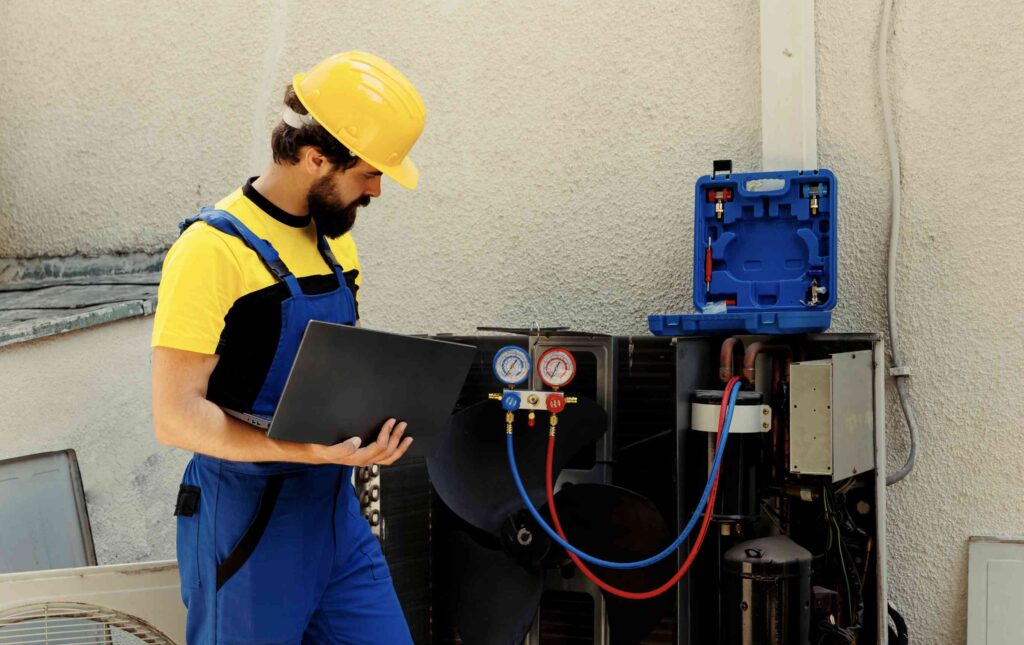
Cut Energy Waste Before It Costs You
If your energy bills keep rising, your AC system could be the culprit. Affordable Air & Heat’s expert technicians inspect every critical component—from compressors to coils—to find out what’s eating up your energy. Routine maintenance not only restores your system’s efficiency but also prevents surprise costs down the line.
Book your tune-up with Affordable Air & Heat today and start saving on every bill.
Schedule Energy-Saving Tune-Up
Don’t Wait for a Breakdown—Act Now
Protect your comfort, your wallet, and your home with one call. At Affordable Air & Heat, we specialize in same-day AC, HVAC, and electrical fixes across Florida, ensuring your system runs efficiently before the heat hits hard. If you’re noticing warm air, strange sounds, or rising energy bills, don’t ignore the signs. Our licensed technicians are ready to diagnose and resolve issues fast—often within hours.
5 Clear Signs Your AC Needs Repair Before It Fails
Q1. How can I tell if my AC needs professional service?
Look out for signs like warm air blowing from vents, strange noises, unpleasant odors, weak airflow, or a sudden increase in your energy bills. If you notice any of these issues, it’s best to call an HVAC technician for an inspection.
Q2. What does it mean if my AC is blowing warm air?
Warm air from your AC vents could indicate problems like low refrigerant levels, a dirty air filter, a malfunctioning compressor, or issues with the thermostat. This symptom requires prompt attention as it often signals underlying issues that can worsen if left unaddressed.
Q3. Why is my air conditioner making unusual noises?
Unusual noises like banging, squealing, or hissing often indicate mechanical issues within your AC system. These could be caused by loose parts, motor problems, or even refrigerant leaks. It’s important to have these noises investigated by a professional to prevent further damage.
Q4. How often should I have my AC system serviced?
Most HVAC professionals recommend annual maintenance, preferably before the start of the cooling season. Regular servicing helps catch potential issues early, maintains efficiency, and can extend the lifespan of your AC system.
Q5. Is a sudden increase in my energy bill a sign of AC problems?
Yes, an unexpected spike in your energy bills can indicate that your AC is working harder than it should to maintain comfortable temperatures. This could be due to various issues like dirty components, refrigerant leaks, or aging equipment. A professional inspection can help identify the cause and restore your system’s efficiency.
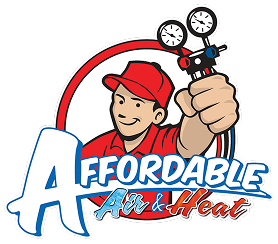
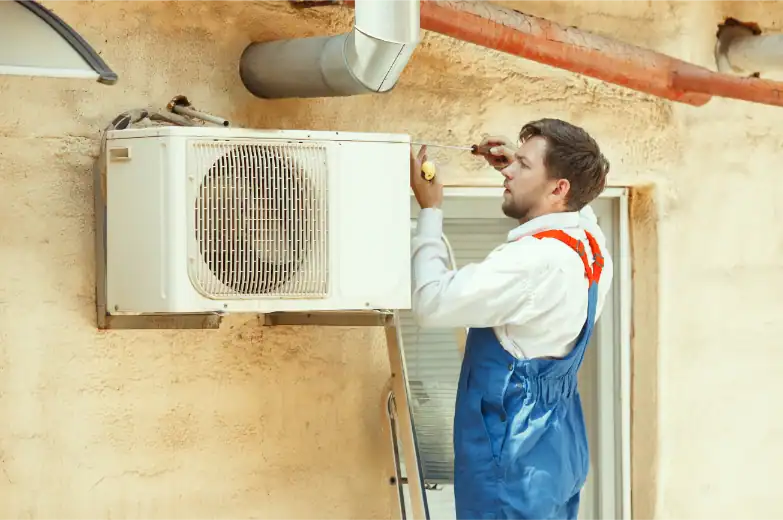
![Mini Splits vs Central Air: Which Saves More in Florida? [2025]](https://affordableair.com/wp-content/uploads/2025/09/mini-air-vs-central-air.png)
